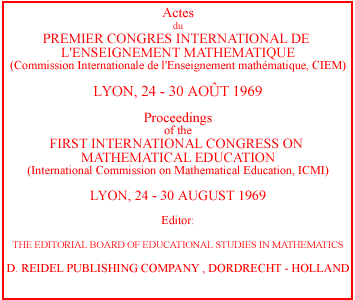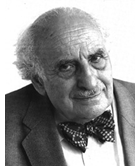 The website is in construction. New files will be uploaded as soon as they are available.
The website is in construction. New files will be uploaded as soon as they are available.
ICME-1
 |
President of ICMIHans Freudenthal |
Contents
H. FREUDENTHAL, Allocution (p. 3)
B. CHRISTIANSEN, Induction and Deduction in the Learning of Mathematics and in Mathematical Instruction (p. 7)
W. SERVAIS, Logique et enseignement mathématique (p. 28)
J. V. ARMITAGE, The Relation between Abstract and 'Concrete' Mathematics at School (p. 48)
R. GAUTHIER, Essai d'individualisation de l'enseignement (Enfants de dix à quatorze ans)(p. 57)
G. G. MASLOVA, Le développement des idées et des concepts mathématiques fondamentaux dans l'enseignement des enfants de 7 a 15 ans (p. 69)
A. ROUMANET, Une classe de mathématique: motivations et méthodes (p. 80)
E. G. BEGLE, The Role of Research in the Improvement of Mathematics Education (p. 100)
A. DELESSERT, De quelques problèmes touchant à la formation des maîtres de mathématiques (p. 113)
A. ENGEL, The Relevance of Modern Fields of Applied Mathematics for Mathematical Education (p. 125)
A. REVUZ, Les premiers pas en analyse (p. 138)
A. MARKOUCHEVITCH, Certains problèmes de l'enseignement des mathématiques à l'école (p. 147)
E. FISHBEIN, Enseignement mathématique et développement intellectuel (p. 158)
E. CASTELNUOVO, Différentes représentations utilisant la notion de barycentre (p. 175)
F. PAPY, Minicomputer (p. 201)
B. THWAITES, The Role of the Computer in School Mathematics (p. 214)
Z. KRYGOWSKA, Le texte mathématique dans l' enseignement (p. 228)
H.-G. STEINER, Magnitudes and Rational Numbers - A Didactical Analysis (p. 239)
H. O. POLLAK, How Can we Teach Applications of Mathematics? (p. 261)
P. C. ROSENBLOOM, Vectors and Symmetry (p. 273) Resolutions (English) (p. 284) Résolutions (French) (p. 285)
Resolutions of the Congress
- The modernization of the teaching of mathematics should be pursued in all countries, both in content and method. "Content and method are inseparable and should be kept continually under scrutiny".
- Mathematics and other disciplines: Collaboration between teachers of mathematics and those of other disciplines should be encouraged.
- International cooperation: Each country should be more fully informed of activities in the other countries. "In particular, the 'advanced' countries should continue to collaborate with the developing countries in the search for solutions appropriate to them"
- It is necessary for the teacher of mathematics to pursue further professional study during his employment.
- "The theory of mathematical education is becoming a science in its own right". The new science should receive places in the Universities or Research Institutes.
- To study the problems of national information, in particular that of the creation of an information bulletin;
- To pay more attention, in the next congress, to pre-school education, elementary education, mathematical education for young people of all ages, and adult education.
Notes
There is no date of publication, nor a list of participants.
All the papers of the congress are also published in Educational Studies in Mathematics (1969-70), Vol. II, 134-418.
The editors regret that the address of Z. P. Diènes, 'La mathématique à l'école primaire', could not be inserted.